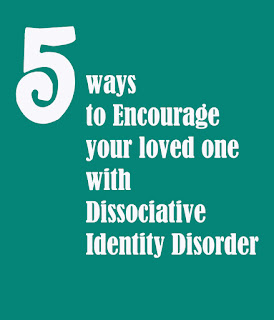5 ways to encourage your loved one with DID
When you try to express your love for your partner with Dissociative Identity Disorder, it may feel at times like pouring water into a bucket without a bottom. Sometimes it feels like no matter what you do, it is not enough. But let me encourage you never to give up on expressing your love toward her.
Become aware how your loved one gives and receives love differently. The way you express your love may not be the same way that your spouse receives love.
For instance, I receive love through physical touch, a head scratch here, a back rub there or simply a pat on the arm. While many people like this sort of touch, for me it has a strong association of expressed love. My wife, on the other hand, responds to words of encouragement. She responds to words like a thirsting person responds to a glass of cool water.
Learn how to speak your spouse's love language and let her know that you love her.
2 Do something thoughtful for her
Have you brought her fresh flowers lately?
Have you taken her on a date?
Have you brought her breakfast in bed?
Have you shared chocolate covered strawberries and champagne with her?
Have you brought her, her favorite cup of coffee?
You probably have a pretty good idea of things that your spouse likes. You probably also know things that some of her alters like.
Doing something special for your spouses alters lets the system know that you are a trusted and caring friend.
3 Make it safe for her to express her pain
Ask your loved one how her day has been and then actually listen.
Don’t try to fix her, don’t suggest that she take her medicine but listen to her pain.
Give her a safe place to tell you everything she wants to say.
Listen to her physical pain, her emotional pain and her depression. Listen and be sympathetic. Be attentive.
4 Believe her
Much of the world is set against your loved one. People don’t know what to do with Dissociative Identity Disorder. Many don’t believe that it’s real. Her abusers will denounce her, therapists will tell her that DID is not real. This is why it is so important you believe.
She needs to know that even when she doesn’t believe, you do.
Denial is an enemy. Denial is pat of her programming and denial is strong. Your loved one will begin to say that nothing happened, that she is just making it all up. The evidence to the contrary, she will begin to want to reconnect with her abuser and ask him to forgive her. This is when you have to believe in her and for her. While we don’t want to perpetuate a lie, I think we as their significant other can see the evidence of the abuse and we need to hold on to the truth for them.
She needs to know that you believe her.
5 Hold her tightly with no other agenda
How many nights have you lain there, holding your spouse while she shook of fear, terrified by nightmares, needing a safe and loving human embrace.
How often have you come through the door at the end of the day to someone who needed to be held and not to let go of.
Our loved ones who struggle with Dissociative Identity Disorder, or PTSD, need to know that there are safe arms of warmth and love to hold them. They need to know that there is someone who gives without expecting something in return, who gives without an agenda.
Be that person.




Comments
Post a Comment